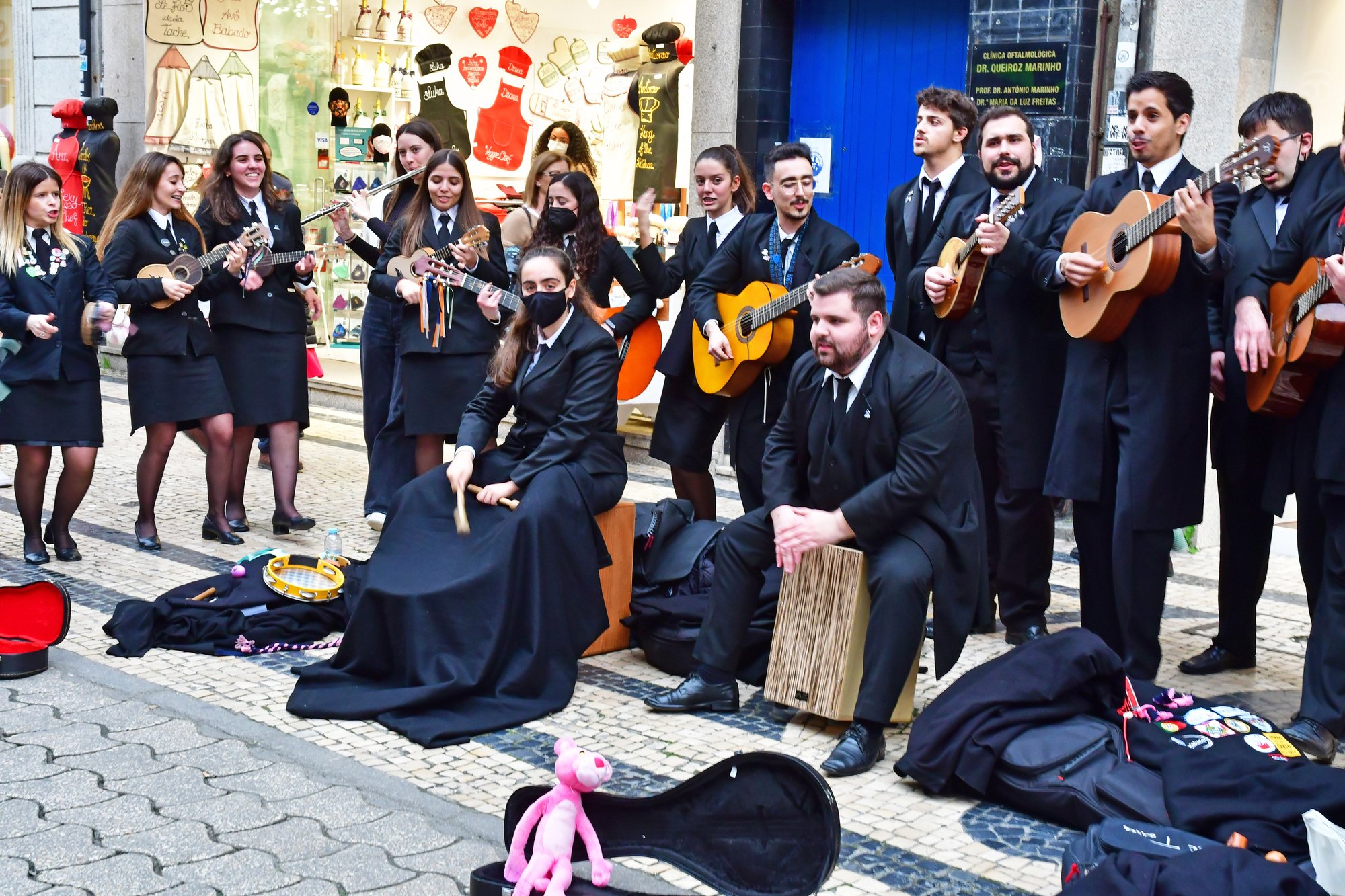Have you ever heard a Portuguese tuna sing? Maybe we already have you scratching your head. No, we don’t mean that kind of tuna. We mean a Portuguese tuna – a musical group that brings together university culture, tradition, and camaraderie into a lively and enduring community. These university-based musical groups dress in distinctive traditional attire and are deeply rooted in Portuguese history and cultural expressions cherished by students and the broader community. Portuguese tunas started several centuries ago and have evolved into dynamic symbols of academic pride.
The History of Tunas
The roots of Portuguese tunas trace back to the medieval period in the Iberian Peninsula around the 13th century. During this time, wandering students and clerics, known as sopistas, roamed towns performing music in exchange for food, shelter, or financial support. These itinerant musicians laid the foundation for what would become the organized tunas. The term tuna itself originates from the Latin word tonus, meaning “tone” or “sound” and emphasizes the musical essence of the tradition.
By the 19th century, tunas had become institutionalized within Portuguese universities. They transitioned from informal groups of performers to structured ensembles that represented their academic institutions at festivals, ceremonies, and public events. This formalization reinforced the tradition as a defining element of university life. The practice spread beyond Portugal through cultural exchanges, particularly to Latin America, where it gained new interpretations while retaining its Iberian essence.

The Structure and Spirit of Tunas
Modern tunas function as organized musical ensembles made up of university students who perform songs accompanied by traditional instruments. Membership is inclusive and fosters a sense of unity and collective purpose among participants. A tuna typically operates with defined roles including a musical director, instrumentalists, vocalists, and performers responsible for choreography.
The experience of being part of a tuna is as much about cultivating bonds and preserving cultural heritage as it is about mastering musical skills. These groups emphasize values such as friendship, dedication, and mutual respect, and form tight-knit communities where members share a profound sense of belonging. Through their performances, they celebrate both their academic identity and Portugal’s cultural traditions.
Traditional Uniforms
The distinctive attire of Portuguese tunas is a visual testament to their historical roots and serves as a unifying symbol for group members. The uniform is inspired by the academic dress of Portuguese university students from the 15th century. Black suits paired with white shirts and ties are a common choice for male members, while female members might wear black skirts or trousers with similar styling. The outfit is completed with a long black cape that holds special symbolic and sentimental value.
These capes are often personalized over time with embroidered patches and designs that reflect the wearer’s achievements, travels, or significant moments within the tuna. The result is a piece of clothing that tells a story full of personal and collective meaning. Additional elements, such as wide-brimmed hats or colorful sashes, are sometimes incorporated and add visual flair and accentuate the theatrical aspect of performances.

Musical Repertoire and Common Songs
The music of Portuguese tunas is a blend of traditional Portuguese songs, folk melodies, and modern compositions. Their repertoire often explores themes of love, friendship, student life, and regional pride through an engaging mix of heartfelt and lively tunes. Traditional Portuguese fado plays a significant role in many performances and infuses them with the soulful and melancholic character that defines this genre. Songs such as Coimbra, also known as April in Portugal, are iconic pieces that pay homage to Portugal’s cultural and academic history.
Regional folk music adds a celebratory and storytelling dimension to tuna performances. These pieces, often rhythmic and vibrant, highlight the traditions of various Portuguese regions. Another important component of their repertoire is university-themed music, such as Balada da Despedida (Farewell Ballad), which captures the poignant emotions of graduation and leaving university life behind. Many tunas also compose original music that blend traditional styles with contemporary influences to express their unique identity and creativity.
Instruments are central to the tuna sound, with classical and acoustic guitars providing a harmonic base. Mandolins add a bright and melodic quality, while tambourines, castanets, and accordions contribute dynamic rhythm and texture to the arrangements.
Performance and Competitions
Performances by Portuguese tunas are a captivating blend of music, theater, and interaction. Members engage with audiences through choreographed routines, humorous skits, and emotive speeches that create an experience that is both entertaining and culturally enriching. Theatricality is integral to their presentations, which makes each performance unique and memorable.
In addition to public appearances, tunas often participate in national and international festivals and competitions. These events, such as the Festival Internacional de Tunas Universitárias (FITU), provide a platform for showcasing talent and creativity. Groups are judged on various aspects, including musical quality, stage presence, choreography, and audience interaction. For tunantes, these gatherings are an opportunity to share their passion, learn from peers, and strengthen bonds with other performers.
Tunas Across Portuguese Universities
Many universities in Portugal host their own tunas and each brings a unique flavor and identity to the tradition. The names of these tunas often reflect the university or region they represent as well as the spirit of the group. At the University of Coimbra, one of the most renowned academic institutions in Portugal, several tunas thrive, including Estudantina Universitária de Coimbra. This group, like many others in Coimbra, honors the city’s legacy as the birthplace of many academic traditions.
In Lisbon, the capital city, Tuna Académica da Universidade de Lisboa represents the vibrant student community of the University of Lisbon. Other Lisbon-based universities, such as NOVA University, also host their own tunas, such as Tuna Feminina da Universidade NOVA de Lisboa, that showcase the growing representation of women in this cultural tradition.
Further north in Porto, the University of Porto is home to Tuna Académica da Universidade do Porto (TAUP), a group that has achieved national and international acclaim. The city also boasts Tuna Feminina de Engenharia da Universidade do Porto that highlights the diverse representation of fields of study within the tuna tradition.
Other notable groups include Tuna Académica do Instituto Superior Técnico in Lisbon, Tuna Universitária do Minho in Braga, and Tuna Académica da Universidade de Évora in southern Portugal. Each of these groups contributes to the rich tapestry of tunas across the country that brings regional pride and unique characteristics to the broader tradition.

Cultural Significance
The tradition of tunas holds a significant place in Portuguese cultural life. Through their performances, tunas connect generations by keeping traditional music alive while adapting it to contemporary contexts. Preservation and innovation ensure the tunas’ continued relevance and appeal.
In Portuguese towns and cities, the presence of tunas in public spaces, historic venues, or university events fosters a sense of nostalgia and communal pride. They represent a celebration of student culture and the enduring values of friendship, creativity, and academic identity. For members, joining a tuna is a transformative experience and creates lasting memories and lifelong connections within the group.
In Conclusion
Portuguese tunas exemplify the interplay between tradition and modernity through music, performance, and cultural pride as part of a dynamic expression of university life. Through their rich repertoire, distinctive uniforms, and engaging performances, tunas continue to captivate audiences and reinforce Portugal’s cultural identity. Their enduring popularity speaks to their ability to inspire, entertain, and preserve a legacy that resonates across generations. Experiencing a tuna performance offers a vivid connection to Portugal’s academic and artistic traditions. Now that you more about Portuguese tunas, you will be ready to listen to one next time without getting a silly image of a fish in your head!


